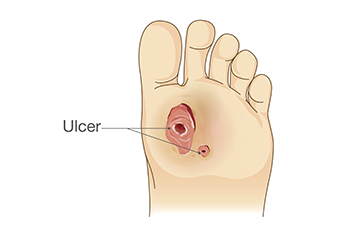1648 US Highway 130
North Brunswick, NJ 08902

A diabetic foot ulcer is an open wound or sore that develops on the feet of individuals with diabetes. High blood sugar levels can damage nerves and blood vessels, leading to reduced sensation and poor circulation, which makes it harder for wounds to heal. Symptoms include redness, swelling, pain, and sometimes drainage or foul odor. Proper treatment is essential to prevent complications, such as infections or even amputation. Early care includes cleaning the ulcer, applying topical medications, and wearing special footwear to reduce pressure. In more severe cases, debridement, which is the removal of dead tissue, or surgery, may be necessary. A podiatrist plays a critical role in treating diabetic foot ulcers by providing wound care, recommending custom footwear, and monitoring the healing process. If you have diabetes and notice any foot sores or ulcers, it is suggested that you promptly schedule an appointment with a podiatrist to prevent serious complications.
Diabetic foot care is important in preventing foot ailments such as ulcers. If you are suffering from diabetes or have any other concerns about your feet, contact Dr. Robert Fink from Brunswick Foot & Ankle Group. Our doctor can provide the care you need to keep you pain-free and on your feet.
Diabetic Foot Care
Diabetes affects millions of people every year. The condition can damage blood vessels in many parts of the body, especially the feet. Because of this, taking care of your feet is essential if you have diabetes, and having a podiatrist help monitor your foot health is highly recommended.
The Importance of Caring for Your Feet
Patients with diabetes should have their doctor monitor their blood levels, as blood sugar levels play such a huge role in diabetic care. Monitoring these levels on a regular basis is highly advised.
It is always best to inform your healthcare professional of any concerns you may have regarding your feet, especially for diabetic patients. Early treatment and routine foot examinations are keys to maintaining proper health, especially because severe complications can arise if proper treatment is not applied.
If you have any questions please feel free to contact our office located in North Brunswick, NJ . We offer the newest diagnostic and treatment technologies for all your foot and ankle needs.

Preventing running injuries is vital for maintaining a consistent training routine and enhancing overall performance. One of the most effective strategies is wearing the right running shoes, which should be tailored to your foot type and running style. Proper footwear provides essential support, cushioning, and stability, reducing the risk of injuries such as stress fractures and tendonitis. Additionally, incorporating a gradual training plan is essential, and avoiding sudden increases in distance or intensity will allow your body to adapt. Regular stretching and strength training can improve flexibility and strengthen muscles, further protecting against injury. Listening to your body and taking rest days when needed is equally important for recovery. If you have injured your foot or ankle while running, it is suggested that you contact a podiatrist who can provide the appropriate treatment solutions.
All runners should take extra precaution when trying to avoid injury. If you have any concerns about your feet, contact Dr. Robert Fink of Brunswick Foot & Ankle Group. Our doctor will treat your foot and ankle needs.
How to Prevent Running Injuries
There are a lot of mistakes a runner can make prior to a workout that can induce injury. A lot of athletes tend to overstretch before running, instead of saving those workouts for a post-run routine. Deep lunges and hand-to-toe hamstring pulls should be performed after a workout instead of during a warmup. Another common mistake is jumping into an intense routine before your body is physically prepared for it. You should try to ease your way into long-distance running instead of forcing yourself to rush into it.
More Tips for Preventing Injury
If you have any questions, please feel free to contact our office located in North Brunswick, NJ . We offer the newest diagnostic and treatment technologies for all your foot care needs.